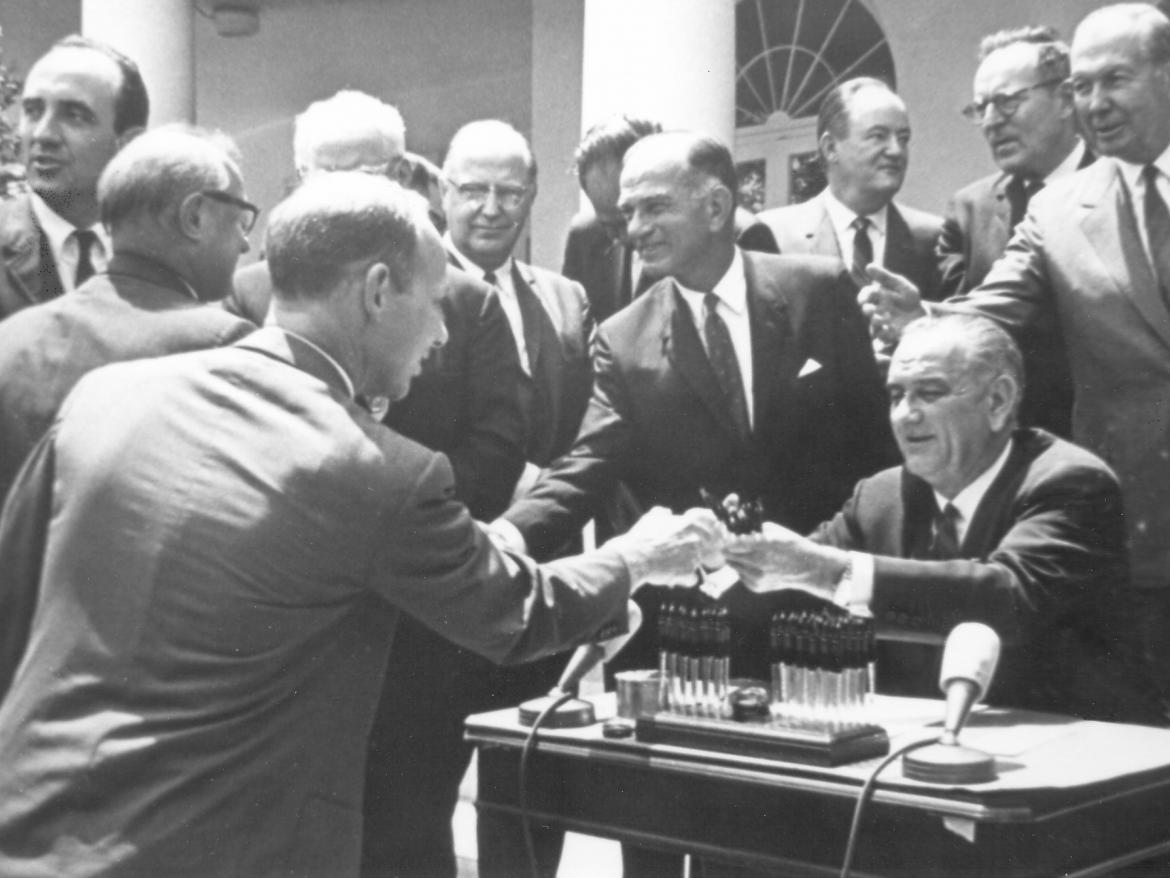We were founded by members of the Religious Society of Friends (Quakers) in 1943 in response to World War II. FCNL was a lobby from the start, working directly with policymakers to solve the big challenges that affect our world. Since then, we’ve advocated tirelessly for peace, justice, and sustainability — and it’s paid off.
2016: President Obama issues an Executive Order committing the U.S. to the stated goal of preventing atrocities and genocide. FCNL has lobbied for decades to reorient U.S. foreign policy away from reactive violence and toward prevention.
2016: : FCNL helps block legislation that would have increased the Pentagon’s budget by $18 billion. FCNL has worked through decades of increases in military spending to create public space for discussion of reductions and alternatives.
2015: The U.S. and Iran conclude a deal to prevent Iran from developing nuclear weapons. FCNL’s multi-year lobbying effort helped keep Congress from undermining this diplomacy.
2015: President Obama announces that the federal government will no longer provide certain military equipment to local police forces. FCNL has been lobbying for several years for legislation to demilitarize police.
2014: FCNL, having worked with Quakers in Kenya to advocate for a U.S. role in violence prevention during Kenya’s 2013 elections, undertakes a similar role in Burundi.
2013: With the U.S. dangerously close to military action in Syria, FCNL visits 400 Congressional offices in a two-week period, pushing for a diplomatic solution. The U.S. and Syria eventually agree on a deal to remove Syria’s chemical weapons.
2013: After years of lobbying by FCNL and other faith organizations, the Violence Against Women Act is reauthorized, with important new provisions to protect women on Native American reservations.
2012: President Obama announces the creation of an Atrocities Prevention Board to help prevent mass violence. FCNL lobbying was a driving factor behind the board’s creation.
2012: Congress terminates funding for a proposed new nuclear bomb plant in New Mexico, after a concerted effort by FCNL lobbyists and grass roots to communicate with key legislators.
2011: FCNL’s lobbyist on nuclear weapons identifies a key program that secures dangerous nuclear material, and organizes grass roots lobbying in support of it. Instead of planned cuts, the nuclear material securitization program’s budget is increased by nine percent.
2011: FCNL leads the faith community in lobbying against amendments that would reduce the Environmental Protection Agency’s authority to regulate mercury. A vote in the Senate defeats all such amendments.
2010: FCNL directs the advocacy that leads to Senate ratification of the New START Treaty to significantly reduce U.S. and Russian nuclear arsenals.
2009: The Indian Health Care Improvement Act is included in the Affordable Care Act passed by the House of Representatives. FCNL has lobbied for years to protect Native access to health care; the ACA reauthorizes it permanently.
2009: Congress formally recognizes the U.S. obligation to withdraw from Iraq as part of its military authorization bill. This follows a multiyear effort by FCNL to prevent the construction of permanent bases in Iraq, as part of a sustained campaign against the war in Iraq.
2008: The National Congress of American Indians awards FCNL its Public Sector Leadership Award, citing work to raise Native issues with the general public and Congress.
2007: FCNL’s renovated building receives a Silver LEED certification. It is the first green building on Capitol Hill.
2005: FCNL hosts the organizing meeting that leads to the founding of the National Religious Campaign Against Torture.
2001: The day after the 9/11 attacks, FCNL issues a statement urging the U.S. not to meet violence with more violence. We display this message on our building and on bumper stickers: “War Is Not the Answer.”
1998: Congress calls for the U.S. to adopt a code of conduct on arms transfers. Since 1993, FCNL has led the coalition that helped propel this legislation forward.
1990: Meeting in FCNL’s building, lobbyists plan the strategy that leads to the passage of the Americans with Disabilities Act.
1988: The welfare bill passed by Congress is heavily influenced by the interfaith domestic human needs working group chaired by FCNL’s Ruth Flower.
1985: The Reykjavik summit leads to a thawing of U.S.-Soviet relations. FCNL lobbied the U.S. ambassador to the Soviet Union in the lead-up to the talks.
1973: One of FCNL’s first interns goes on to found the Washington Office on Latin America.
1964: Twenty-one senators personally thank FCNL’s Richard Taylor for help in passing the Civil Rights Act.
1961: Congress creates the Peace Corps. Rep. Henry Reuss (WI) calls FCNL’s role in the Peace Corps’ creation “pivotal.” FCNL advocated for such a program since 1957.
1952: The Universal Military Training bill fails in the House, ending an 8-year campaign by FCNL to defeat it.
1943: Friends Committee on National Legislation is founded.
